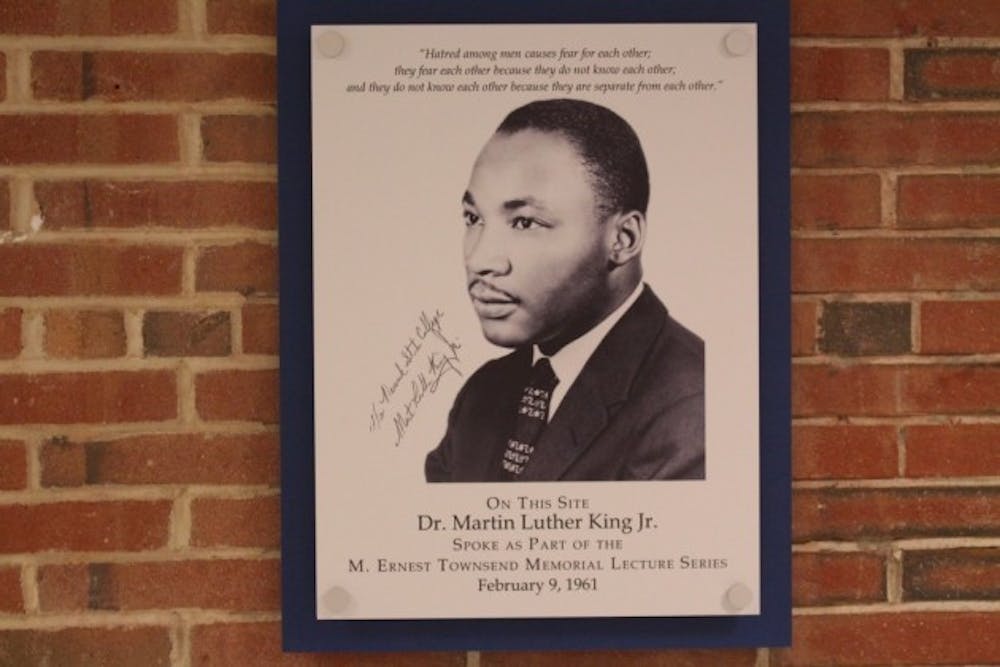Memorial plaque outside D’Angola gymnasium
Jacob Fermaint l The Cougar’s Byte
On Tuesday, February 9, 2016, students gathered in the D’Angola gymnasium for a commemoration of the late Dr. Martin Luther King Jr.
From 3:00 p.m. to 4:30 p.m., a ceremony ensued in remembrance of his visit to Kean University 55 years ago. Frank Esposito opened the event by recounting the visit. He states, “55 years ago on this day, it was a chilly day similar to today, Dr. Martin Luther King walked into this exact space…”

Frank Esposito welcoming the crowd
Jacob Fermaint l The Cougar’s Byte
The observance featured two performances by the Kean University gospel choir, student readings and remarks by various faculty and staff.
Michelle Thompson, junior history major explains why she attended the service. She states, “I feel like a lot of times Kean [University] gets a bad reputation but we do so much, especially the history department, we have so many events like this and so many resources…”
In 1961, Dr. King was frequently on the road speaking to colleges, visiting universities such as Drew University, Monmouth University and New York University [NYU]. On Feb. 9, 1961, he made his way to Newark State Teachers College later renamed Kean University. While there, he gave a speech entitled, “The Future of Integration” at the D’Angola Gymnasium. In his speech, he discussed his commitment to nonviolent civil disobedience as a form of social change. In a response to an audience member’s question, he shares his definition of equality.
He stated, “…it is equal opportunity for all men and that every person should have equal protection under the law to pursue a noble end of life.”
At the time of his visit less than ten percent of Kean University’s student population was African or black. After his unforgettable speech and other nationwide sermons, Kean University was inspired to diversify their population and embrace multiculturalism. The only available recount of his visit was what reporter, Andrea Lello wrote in the student newspaper, the Reflector. Thanks to her, that day is a moment frozen in Kean University’s history.
Dr. Martin Luther King Jr is revered as one of most courageous icons within the Civil Rights era of 1958-1968. From the beginning, he was firmly committed to ideals of diversity, equity and opportunity. As an activist, he always entwined those themes into his movements. At the forefront of the civil rights movement, he was proactive in his efforts. He promoted peace in a world, which at the time, was plagued with violence.

Kean University gospel choir
Jacob Fermaint l The Cougar’s Byte
As referenced in the ceremony, Dr. King once said “Men hate each other because they fear each other; they fear each other because they don’t know each other; they don’t know each other because they can’t communicate with each other; they can’t communicate with each other because they are separated from each other.”
His movements for the community are milestones that are timeless. As a civil rights activist, his loyalty was with his fellow African Americans but also with people as a whole. So often people believe that the two are mutually exclusive but King understood their interaction. His ideals and philosophies have molded the minds of multiple generations.
The event was organized not only to honor Dr. King’s legacy but also in celebration of African American History Month. Over the years, this month has become a combination of many things. People take the time to specifically celebrate African history and culture. They pay homage to the countless people that paved the way for African Americans of today. They recognize the ongoing determination and bring awareness to contemporary issues they faced.
David Paul, junior education major quoted King stating, “Our lives begin to end the day we are silent about things that matter.”
Since Dr. King’s visit, Kean University has demonstrated a consistent commitment to civil rights, equal opportunity, multiculturalism and diversity. Kean University has an Office of Africana Studies which is an interdisciplinary approach to the experiences of African American peoples throughout the world. Beyond that, Kean University works copiously to make sure every demographic is recognized, represented and appreciated.
Farahi states, “I think if Dr. King was here again today, he would say we did a good job and we’ve come far but he would also say to us that the job is not done yet. Keep moving.”
Martin Luther King Jr. is most widely known for his dream. He dreams of a society wherein all people are treated as such, with acceptance and respect for differences but more regard for similarities. That dream still persists today. It is echoed through the thousands of people he has inspired over countless generations. While we have made tremendous strides in the way of equal opportunities and truly celebrating diversity, society still has a long way to go.
Farahi states, “…the respect that you show to each other and social justice causes for which you fight determine how fast and how far we go.”
For African American college students, Dr. King and his endeavors have made many of their opportunities possible. Beyond that, he has inspired and motivated many of them as a renowned leader within their history. Consequently, they go through their collegiate experience remembering him and his perseverance on their educational journey.

President Dawood Farahi
Jacob Fermaint l The Cougar’s Byte



